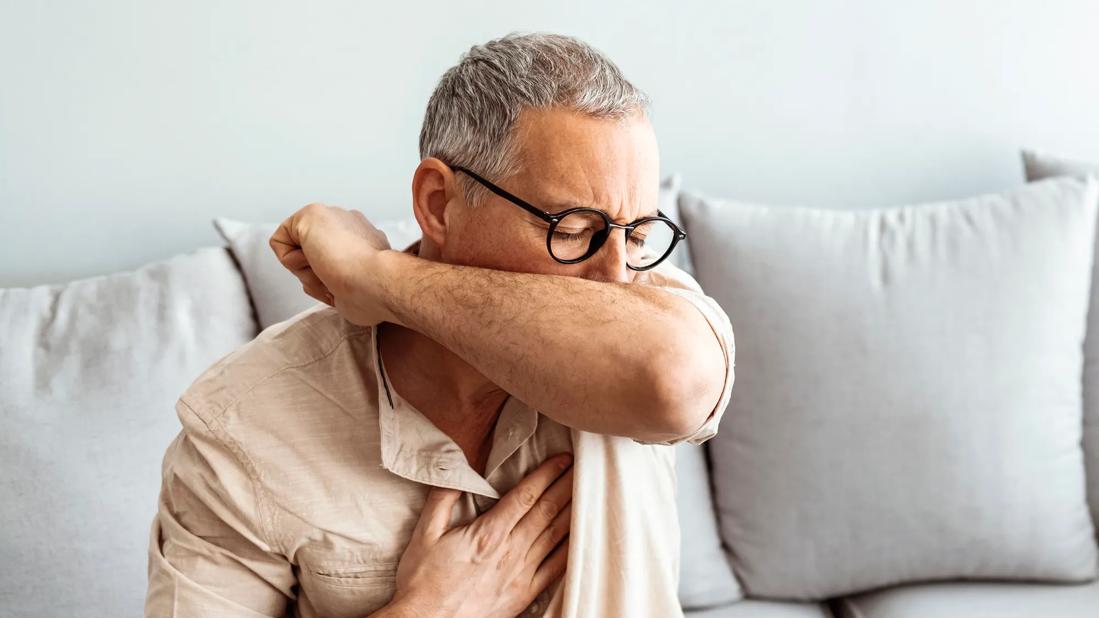Germs spread quickly and easily, so covering your face, washing your hands and avoiding close contact are key

Image content: This image is available to view online.
View image online (https://assets.clevelandclinic.org/transform/22b53546-cc39-4b0d-a09b-661caed04b7a/coughing-into-arm-1306472035)
Person coughing into their elbow, with hand on their chest
It’s been a few years since the start of the COVID-19 pandemic, but if there’s anything it taught us, it’s how easily germs spread and how important it is to practice good hand hygiene and cough etiquette. Each of us has a role to play in protecting those around us, especially if we know we’re sick.
Advertisement
Cleveland Clinic is a non-profit academic medical center. Advertising on our site helps support our mission. We do not endorse non-Cleveland Clinic products or services. Policy
When you’ve got a bug — whether it’s allergies, the common cold or something else — here’s what you need to know about coughing or sneezing around other people.
“Cough etiquette” is how you act when you’re out in the world with a cough, sniffle or sneeze. It’s all about the actions you take to keep your germs from spreading to people around you.
Why, exactly, is it so important?
“When you cough into the air, you can actually send germs as far as 3 to 6 feet in front of you,” explains infectious disease specialist Frank Esper, MD. “And if you cough into your hands, you could transfer germs from place to place when you touch something else.”
So, what does cough etiquette entail? Dr. Esper shares some guidelines for when you’re out in public or even at home with family.
You may feel like your days of masking are behind you, but they’re still one of the best ways to protect the people around you.
“Face masks reduce the rate of your respiratory droplets going out into the open air and reaching and infecting others,” Dr. Esper explains. “This protects both yourself and those around you.”
If you’re not wearing a mask, use a tissue to cover your mouth and nose every single time you cough or sneeze. Resort to coughing into your elbow if a tissue isn’t available.
Advertisement
“Never cough into your hands or open air,” Dr. Esper urges, “and always turn your face away from people around you when coughing or sneezing.”
Serious respiratory viruses are commonly spread by germs on your hands that can lurk even if your hands seem clean, so it’s important to wash your hands often. Use soap and water or an alcohol-based hand sanitizer that contains at least 60% to 95% alcohol.
Viruses are also spread by touching your face after touching contaminated surfaces. Never touch your mouth, nose or eyes with unwashed hands. If you do, immediately wash your hands before touching anything else.
Refrain from shaking hands, kissing, hugging, sharing food or utensils or otherwise making contact and spreading germs when you’re sick.
“In general, steer clear of others, especially those who are considered high-risk,” Dr. Esper advises.
Ever leave your tissues lying around at home? Cut the habit and place used tissues into a trash can immediately. And when you’re sick, sanitize surfaces you may have coughed on or touched with germy hands.
If you’re feeling under the weather, the most important thing you can do is stay home and avoid carrying your germs to school, work or anywhere else.
With so many symptoms in common, it can be hard to tell the difference between illnesses like colds, the flu, RSV and COVID-19. Plus, depending on what you’re dealing with, it can take up to a week for symptoms to appear.
If you’re starting to experience symptoms like coughing, sore throat and achy muscles, the best thing to do is to act as though you are contagious — and start doing your part to keep your germs to yourself.
Advertisement

Sign up for our Health Essentials emails for expert guidance on nutrition, fitness, sleep, skin care and more.
Learn more about our editorial process.
Advertisement
Honey, humidity and the right OTC meds can help bring on cough relief
Allergies, postnasal drip, asthma or reflux could be to blame for a cough that won’t quit
Honey can help relieve a cough by lowering inflammation in your airways and loosening up mucus
Dry coughs mean irritation, while wet coughs mean mucus
A chronic cough is one that lasts for eight weeks or more — and means you should see a healthcare provider
Over-the-counter options range from syrups to pills, lozenges to menthol rubs — but medication isn’t always the best treatment
Kids under 4 shouldn’t use cough and cold medicine — older kids may or may not benefit
Germ-killing chemicals in the water can lead to respiratory issues
Prioritize your health by managing stress, strengthening your social connections and getting quality sleep
Bolsters, blankets, pillows and blocks can offer extra support, stability and comfort
Allergies, postnasal drip, asthma or reflux could be to blame for a cough that won’t quit